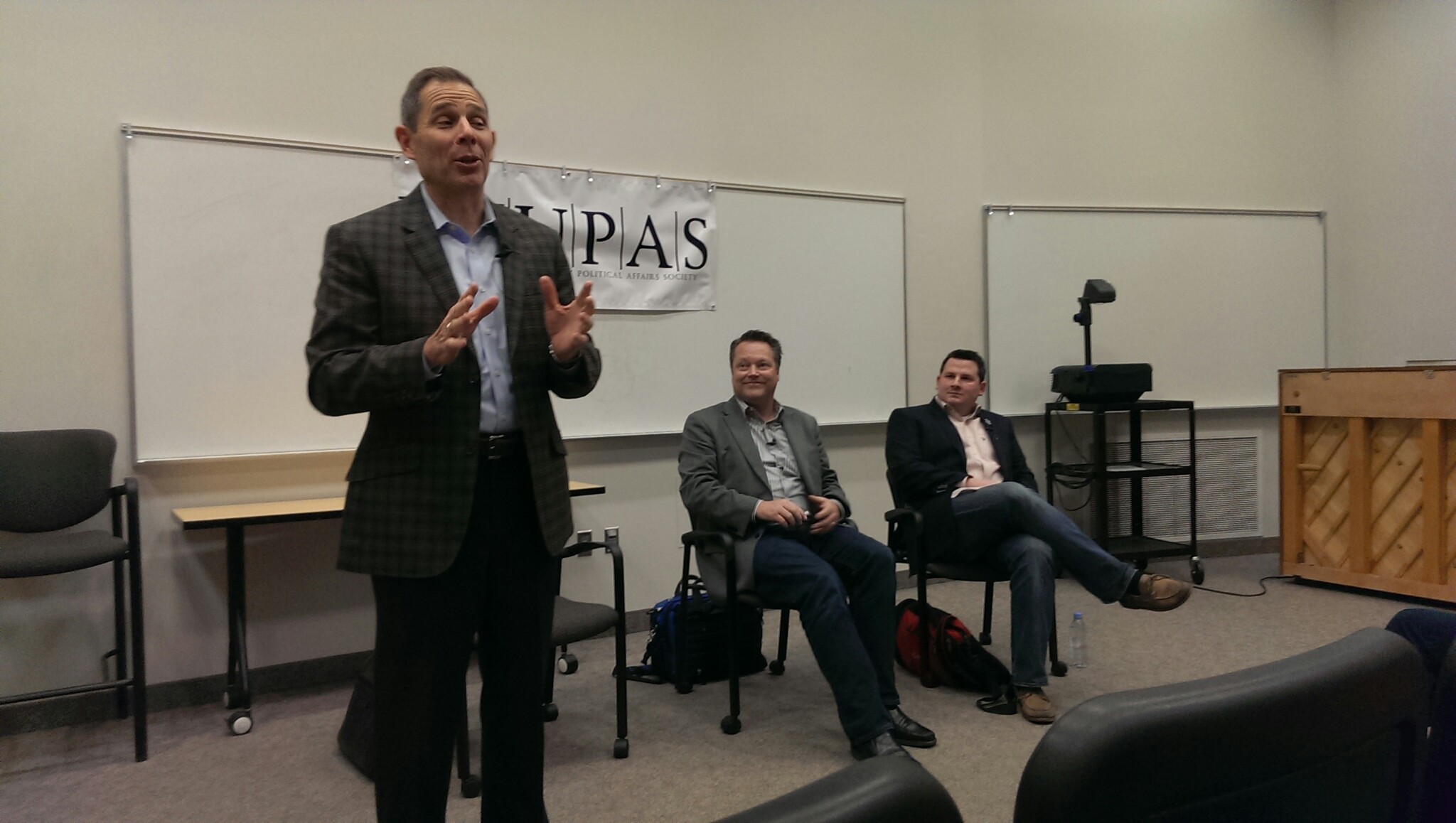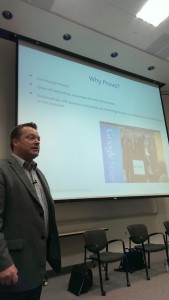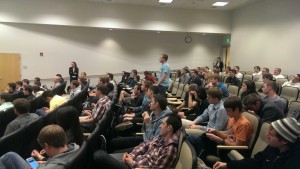
Mayor John Curtis told BYU students and professors the saga of how Provo attracted Google Fiber during a forum on Nov. 18.
The forum, entitled “Connecting Government and Business: How Provo Got Google Fiber,” was sponsored by the BYU Public Affairs Society. The society hosted Mayor Curtis along with Google Fiber representatives John Richards and Devin Baer.
The mayor began the forum by explaining the history of the iProvo fiber-optic network that runs through the city and how initial financial struggles turned into a historic opportunity for Provo.
“Fiber 10 years ago was just not something people were doing,” Curtis said. “It was really an early adoption in our city. The people who did this had this incredible vision of what could be, what could happen to a city if it was connected by Fiber.”
Provo incurred $40 million in debt in order to install iProvo, which was supposed to be a large new source of revenue for the city. But the network was far from being a cash cow, according to Mayor Curtis.
“Not only did it not provide any income, it was actually running at a deficit,” Curtis said. “The Daily Herald called iProvo a millstone around our necks.”
The city decided to sell the network to a private company in the agreement that they would pay the $270,000-per-month debt payment. The company was able to pay for a few months but then told the city they would be unable to afford the payments. Curtis said Provo then lowered the payment because it didn’t want to buy iProvo back. After 18 months the company told the city it could not even meet the reduced payments, and Provo was forced to re-purchase the failing fiber-network.
Provo was left with three choices: The city would either have to resell the network, run the network through the city government or simply turn it off.
The mayor went on to say the city does well at things like sewers, roads, parks and power but it didn’t do really well with something as high-tech and quick-moving as the fiber-optic network, so running the network was off the table.
The city decided to sell the network, and Mayor Curtis said the city was willing to entertain any bid. The response, however, was not what they expected.
“Nobody stepped up to pay us even a penny for our $68 million asset,” Curtis said.

After the announcement of Google Fiber and a few influential conversations with others, Mayor Curtis decided to contact Google in hopes they would be willing to pay the $20 million asking-price to take over the failing iProvo network.
“I have one of the few cities in the entire world that is connected by a fiber network, and all we’re doing is complaining and not doing anything to maximize it,” Curtis said. “It changed the whole dialogue of where we were going in the city with this network.”
After a long and exhaustive period of attempting to contact Google, Curtis was finally able to secure a meeting with company officials. He called it a “golden opportunity.”
The Google executives made the trip to Provo, and a sequestered meeting was held in the Marriott hotel in order to privately discuss the possibility of Google taking over iProvo.
“We talked to them about our network and Provo. We told them what a cool place Provo was; they had not been to Provo before,” Curtis said. “We told them that we were rated by Forbes as the number-one place to do business in America. We told them about our entrepreneurial mindset here in the city and our great grasp of technology. They walked away from the meeting, and we said, ‘Yes! This is it. They’re going to buy the network from us for $20 million.”
Google’s response, however, was not what Curtis had expected. Curtis said Google replied that they would not be able to buy the network. He said his heart sank at the thought, but that feeling soon changed when the executive on the phone said that while they couldn’t buy the network, they would be willing to come to Provo, provide free Internet for all of its residents for seven years and upgrade iProvo to gigabit speeds.
The catch? Google was only willing to pay one dollar for the network.
Although Curtis said he wasn’t happy taking the loss, he expressed what an amazing opportunity this was for the city and began preparations for the “epic” announcement that would take place four months later on April 17.
“For weeks people had fun guessing what it was, and what was amazing was that nobody knew,” Curtis said. “We were actually able to contain that secret right until the last minute.”
Once the announcement was made public, the level of excitement throughout the city was tangible. The possibilities that Google Fiber would bring to the residents were innumerable, and Mayor Curtis said at that moment, life in Provo changed forever more.
“Provo is uniquely positioned to be the only city, that I know of, in the world where every single resident will have access to Internet at no cost,” he said. “And those who chose to access gig-speed will be able to do so for an incredibly reasonable price of $70. Think about what that does to the future of education, of health care, of business, of community involvement, of all of those things.”
Despite the possibility for innovation, Curtis was quick to point out that Google Fiber has only given Provo a head start.
“Before long, everyone is going to have a ‘gig,’” he said. “Provo needs to maximize the moment while we’re ahead.”

Devin Baer, the head of sales and marketing for Google Fiber in Provo, explained how unique Provo’s Google Fiber is later in the forum.
“What’s unique about Provo is the construction fee. Because of the nature of the deal that was done with Provo, it’s only $30,” Baer said. “In other Google Fiber cities it’s ten times that. It’s $300 because we’re building the infrastructure from scratch.”
“You can imagine in the low-income sector families that don’t have Internet or can’t afford it currently,” he continued. “If they wanted to sign up for free Internet in Kansas City, or Austin, Texas, they had to foot a $300 bill. That’s not marginal; that’s pretty big. But in Provo, it’s ten percent of that, which means that any resident can get free Internet for seven years for a one-time $30 fee.”
“Not only is that unprecedented generally, it’s really unprecedented for Google Fiber too because (Provo) is the only city out of the three right now that, for a $30 construction fee, you can get free Internet for seven years,” Baer concluded.
John Richards, head of operations for Google Fiber in Provo and former BYU professor, explained some of the features and benefits of Google Fiber during the forum, all of which can be found at fiber.google.com.
He also said Google would be sponsoring an internship for students called the Community Leadership Program. Students wishing to apply for the internship will be assisting efforts to improve digital literacy in organizations in need throughout the area. Application information will be announced in the future.




